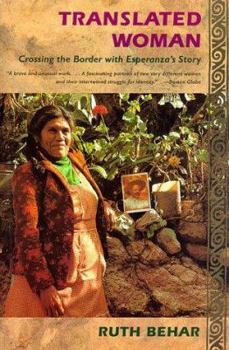Translated Woman: Crossing the Border with Esperanza
Select Format
Select Condition 
Book Overview
Translated Woman tells the story of an unforgettable encounter between Ruth Behar, a Cuban-American feminist anthropologist, and Esperanza Hern ndez, a Mexican street peddler. The tale of Esperanza's... This description may be from another edition of this product.
Format:Paperback
Language:English
ISBN:080707053X
ISBN13:9780807070536
Release Date:January 1994
Publisher:Beacon Press (MA)
Length:400 Pages
Weight:1.25 lbs.
Dimensions:1.0" x 6.0" x 9.0"
Customer Reviews
3 ratings
translated book
Published by Thriftbooks.com User , 20 years ago
This book was amazing. It was a very easy read, not like many ethnographies. It was so refreshing to have the author sit back and let someone else (Esperanza) talk for the first part, to tell us her historia. I also enjoyed the last part, her reflejo, because it showed the reader that she, indeed, is a real person. In doing this I came to see the real process it takes to write an ethnography, all the dillemmas, situations and problems that arrise. Wonderful overall.
Esperanza Shines, Ruth Reflects
Published by Thriftbooks.com User , 21 years ago
Esperanza, a poor Mexican street peddlar, is befriended by Ruth, an American anthropologist with Cuban-Jewish roots during the course of Ruth?s fieldwork in Mexico. They become friends, comadres, and Ruth decides to tell Esperanza?s story. Questions arise. Why does Esperanza want to tell Ruth the whole story of her life ? Why does Ruth decide to record it? In what format will Ruth present that story so that North American readers can understand it ? How will Ruth place that story into the framework of the anthropological profession or into the feminist discourse ? Does she have to do that in a traditional way ? Does Ruth have the right to Esperanza's story ? Is she exploiting Esperanza, who, after all, can never come to the USA in person except, in the most unlikely of circumstances, as a servant ? (Ruth can drive down to Mexico more or less at will.) Yes, of course it is Ruth who poses all these questions and then answers them. The result of these questions is a very interesting and iconoclastic book, which, though at times difficult to read, clearly raises many questions. TRANSLATED WOMAN might be called the archetype of a modern anthropological creation because 1) the author does not hide behind the curtains, but places herself in the center along with the subject and 2)like current Anthropology as a field, it is so full of self-doubt, both personal and professional, that a reader perceives more questions than answers, the main one being, ?if Ruth were so full of guilt and indecision about the merits of such a study, why didn?t she just drop it ?? I, for one, thought that if she felt it were wrong, then she shouldn?t have continued, but if she did continue, then hand-wringing and meek self-castigating sentences were unnecessary. Nearly every interaction in our world has either class, race, or sexual components. Are we to refrain from communicating with all but our class, racial, or sexual doubles unless we worry that we are abusing some kind of power ? Exploitation exists, many anthropologists have severely exploited their subjects (as have people of every kind) but it does not follow that all relationships across cultures, from rich to poor society, are therefore exploitative. Common humanity is what counts the most between individuals. The USA certainly exploits Mexico, but that does not make Ruth Behar an exploiter. Collective guilt ? I thought we?d seen the end of that, at least in anthropological circles. With a strong, independent woman like Esperanza, it is very unlikely she would have pursued the connection if she did not feel she also benefitted from it. Ruth,however,persisted in swimming in the pool of uncertainty. She faulted herself for driving to poor Mexquitic village in a new car and then worrying about possible damage. She dressed inappropriately as she accompanied her comadre around the streets and bemoaned her incongruity. She notes how intrusive her photography must have been, but she took the photo
Crossing the Border
Published by Thriftbooks.com User , 23 years ago
This is a beautiful narrative that crosses the boundaries of culture, class and gender to let the reader see life through the eyes of an uneducated Mexican woman. The authors tells the extraordinary story of Esperansa's life and the friendship she developed with her. (The author is a professor of anthropology at the University of Michigan). In spite of the authors background, the style is rich and unique. The book would be easy read and very entertaining for people able to appreciate women's perceptions and spirituality in unprejudiced manner. I have very different backgound from both the writer and the main character and yet could relate to the story and the experience. It made me re-think my own cross cultural experiences and identity of a woman.





